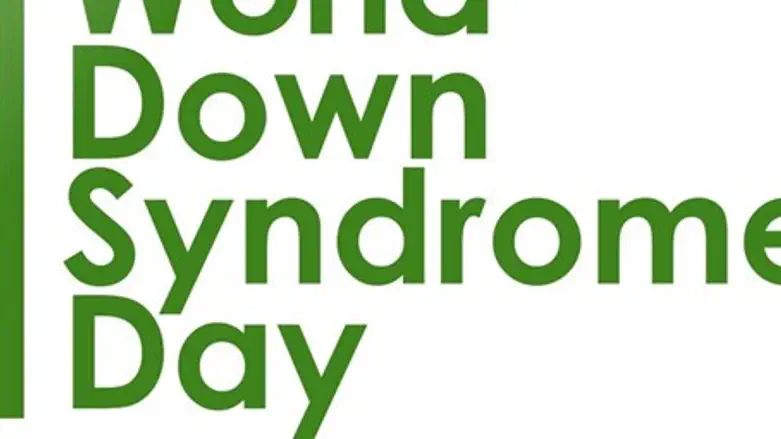
Imagine a conference where the master of ceremonies is a 29 year old young woman with Down Syndrome, known for her interviews with key persons such as President Shimon Peres, and you will understand why Arutz Sheva felt that the audience attending this week's World Down Syndrome Day Conference could have been the model for the afternoon session's topic - "Inclusion."
On April 9th, more than 400 participants came to Hadassah Hebrew University Medical Center at Mt Scopus, Jerusalem for annual World Down Syndrome Day. It was to have taken place on March 21st together with the rest of the world, but was delayed because of the Pesach holiday and the visit to Jerusalem by President Obama.
Singapore Down Syndrome Association (Balbir Singh) and the National Institute of Child Health and Human Development in Israel (Joav Merrick) were the first to initiate this day (every year on March 21 - another name for Down Syndrome is Trisomy 21) in 2006, putting the focus on people with Down syndrome in both societies.
In 2011, the United Nations made this a permanent annual world event. Since 2006, there has been an annual World Down Syndrome Day (WDSD) in Israel.
From 2006-2009, this initiative was conducted in collaboration between the National Institute of Child Health and Human Development (NICHD), Division for Intellectual and Developmental Disabilities, Ministry of Social Affairs and Social Services and Ben Gurion University of the Negev in Beer-Sheva. From 2010, it is held in collaboration with the National Down Syndrome Center at the Division of Pediatrics, Hadassah Hebrew University Mt. Scopus Medical Center under the direction of pediatrician Dr. Ariel Tenenbaum.
This annual event is now a broad collaboration between Hadassah, NICHD, Ministry of Social Affairs, Municipality of Jerusalem, Jerusalem Down Syndrome Association (Yated), Keren Shalem and the SHALVA Center in Jerusalem.
Emcee Efrat Dotan charmingly introduced all the speakers and presenters in both sessions of the day’s varied program.
The first session presented medical advances and new technology. Dr. Ariel Tenenbaum presented new research in this field, both from Israel and abroad. One recent research project from Hadassah showed that persons with Down syndrome are hospitalized more often and for longer periods than the general population. Yidida Levin-Stranberg from Ariel University and Rina Cohen from the Ministry of Education introduced the application of ipad technology in education and communication, showing how this instrument has really opened a whole new world for children and youth with special needs, where they are now able to communicate their needs and wishes using this technology.
The second session was devoted to adolescents and adults and dealt with the issue of inclusion. Danny Katz, from the Division for Intellectual and Developmental Disabilities of the Ministry of Social Affairs and Social Services, reported on the four year old joint project of the Ministry, AKIM and the IDF to integrate persons with special needs in the army.
Since its start in 2008, 31 such soldiers have been enlisted in the army and the success of the project was evident from the words of one of the officers working with sergeant Reut, who has already served two years and is interested in remaining in the army. The participants also heard about the experiences of Shmulik, who is doing Sherut Leumi (National Service) at the Reishit Elementary School (a model school for mainstreaming) in Gush Etzion, and ended the session seeing how the basketball team Hapoel Jerusalem has adopted the children of SHALVA and is training them for matches.
Contact Information: National Down Syndrome Center, Division of Pediatrics, Mt Scopus Campus,Hadassah Hebrew University Medical Center, POB 24035, IL-91240 Jerusalem, Israel. E-mail: ds@hadassah.org.il
Joav Merrick, who made aliyah from Copenhagen, Denmark in 1989, is professor of child health and human development affiliated with Kentucky Children’s Hospital, University of Kentucky, Lexington, United States and the Division of Pediatrics, Hadassah Hebrew University Medical Center, Mt Scopus Campus, Jerusalem, Israel and since 1991 the medical director of the Health Services of the Division for Intellectual and Developmental Disabilities, Ministry of Social Affairs and Social Services, Jerusalem and also the founder and director of the National Institute of Child Health and Human Development in Israel. Received the Peter Sabroe Child Award for outstanding work on behalf of Danish Children in 1985 and the International LEGO-Prize (“The Children’s Nobel Prize”) for an extraordinary contribution towards improvement in child welfare and well-being in 1987.